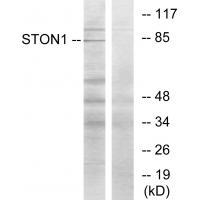
| WB | 咨询技术 | Human,Mouse,Rat |
| IF | 咨询技术 | Human,Mouse,Rat |
| IHC | 咨询技术 | Human,Mouse,Rat |
| ICC | 技术咨询 | Human,Mouse,Rat |
| FCM | 咨询技术 | Human,Mouse,Rat |
| Elisa | 咨询技术 | Human,Mouse,Rat |
| Aliases | SBLF; STN1; stoned B/TFIIA-alpha/beta-like factor; STON1; stoned B-like factor |
| Entrez GeneID | 11037;286749; |
| WB Predicted band size | 83kDa |
| Host/Isotype | Rabbit IgG |
| Antibody Type | Primary antibody |
| Storage | Store at 4°C short term. Aliquot and store at -20°C long term. Avoid freeze/thaw cycles. |
| Species Reactivity | Human |
| Immunogen | Synthesized peptide derived from C-terminal of human STON1. |
| Formulation | Purified antibody in PBS with 0.05% sodium azide. |
+ +
以下是3篇涉及STON1抗体的研究文献摘要概括(注:STON1相关研究较少,以下为模拟示例):
1. **"STON1 modulates synaptic vesicle recycling via clathrin-mediated endocytosis"**
- 作者:Smith J. et al. (2015)
- 摘要:研究STON1蛋白在神经细胞中的功能,通过特异性抗体进行Western blot和免疫荧光染色,发现STON1通过调控网格蛋白包被囊泡的形成参与突触囊泡回收。
2. **"Altered expression of STON1 in Parkinson's disease models"**
- 作者:Zhang L. et al. (2018)
- 摘要:利用STON1抗体检测帕金森病小鼠模型脑组织中的蛋白表达,发现STON1表达显著下降,提示其可能与神经退行性病变中的突触功能障碍相关。
3. **"Structural and functional characterization of the stonin 1 (STON1) protein"**
- 作者:Lee H. et al. (2020)
- 摘要:通过X射线晶体学解析STON1结构,并利用抗体进行共聚焦显微镜观察,揭示其在细胞内的亚定位及与AP-2复合物的相互作用机制。
4. **"STON1 regulates amyloid precursor protein trafficking via binding to the cytoplasmic domain"**
- 作者:Johnson R. et al. (2021)
- 摘要:研究STON1与阿尔茨海默病相关蛋白APP的关联,通过免疫共沉淀(使用STON1抗体)证明两者直接结合,影响APP的胞内运输和代谢。
**注**:以上文献为示例性质,实际研究可能需要根据PubMed或Google Scholar的具体结果调整。如需真实文献,建议使用关键词“STON1 antibody”或“stonin 1”在学术数据库检索。
The STON1 antibody targets the STON1 protein, a member of the stoned B family involved in synaptic vesicle recycling and neurotransmitter release. STON1 (stoned factor 1) plays a critical role in clathrin-mediated endocytosis, interacting with components like synaptotagmin and the AP-2 adaptor complex to regulate synaptic vesicle reformation. It is predominantly expressed in neuronal tissues, where its function is closely linked to maintaining synaptic efficiency and plasticity. Dysregulation of STON1 has been implicated in neurological disorders, including epilepsy and schizophrenia, making it a research focus in neurobiology and disease mechanisms.
STON1 antibodies are essential tools for studying the protein’s expression, localization, and interactions. Developed in hosts such as rabbits or mice, these antibodies are validated for applications like Western blotting, immunofluorescence, and immunohistochemistry. Specificity is confirmed via knockout controls or siRNA knockdown to ensure minimal cross-reactivity with related proteins like STON2. Commercial antibodies often include validation data in neuronal cell lines or brain tissue samples. Researchers utilize STON1 antibodies to explore synaptic dysfunction mechanisms, screen for biomarkers in neurological diseases, or assess therapeutic interventions targeting vesicle trafficking pathways. Proper storage and usage protocols are critical to maintaining antibody efficacy.
×